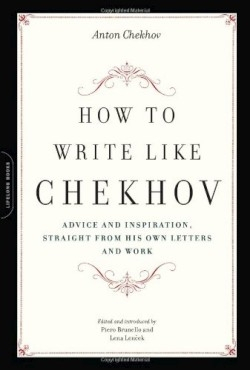How to Write Like Chekhov
Advice and Inspiration, Straight from His Own Letters and Work
Chekhov never wrote a “how to” book on writing but Brunello and Lencek’s compilation does much to meet the need. The advisory excerpts that the editors have mined from his work and letters and assembled here present a powerfully incisive and empathetic mind. Chekhov combined the analyti-cal physician with the disciplined artist two personae that produced a tough-minded writer—far different from the traditional image of a bed-ridden invalid felled by tuberculosis at forty-four; the suffering “voice of twilight Russia” to borrow a phrase from Nina Toumanova one of his earlier his biographers.
Chekhov’s acute awareness marks many of the comments cited in part one “Theory”—one of which explains his lifelong commitment to and rewards from practicing medicine: “…my medical work has had a serious impact on my writing; it has significantly broadened the scope of my observation….” Yet he stated modestly that he had “no worldview” but confined himself to “describing how my protagonists love marry breed die and talk.” He was a master of the “show don’t tell” school: “avoid de-scribing the emotional states of your protagonists; one should try to make these apparent from their actions.” (His handling of Kostya’s suicide in The Seagull reflects this belief at work.) Chekhov described medicine as his “lawful wife” and literature as “his mis-tress.” Not atypically the latter was more demanding than the former and Chekhov became advisor and critic for a myriad of friends to whom he provided endless help.
One short-take is particularly is valuable: “One must never lie. Art has this great specification: it simply does not tolerate falsehood. One can lie in love politics and medicine; one can mislead the public or even God; but there is absolutely no lying in art.” Add to this: “It is easier to write about Soc-rates than about a young lady or a cook” and “Cut mercilessly”—advice that could lighten the burden placed on us by the I Must Write generation.
Part two “Demonstration” is drawn entirely from sections of Sakhalin Island (published in 1895) and Chekhov’s letters about his heroic five-year project—crossing Russia to report on the notorious island prison camp in the wind-blasted Sea of Okhotsk. The excerpts forcefully present the master’s penetrating analysis of every aspect of life death emotion and human behavior in the huge camp. Biographical and other notes add to this most useful book.
Disclosure: This article is not an endorsement, but a review. The publisher of this book provided free copies of the book to have their book reviewed by a professional reviewer. No fee was paid by the publisher for this review. Foreword Reviews only recommends books that we love. Foreword Magazine, Inc. is disclosing this in accordance with the Federal Trade Commission’s 16 CFR, Part 255.

